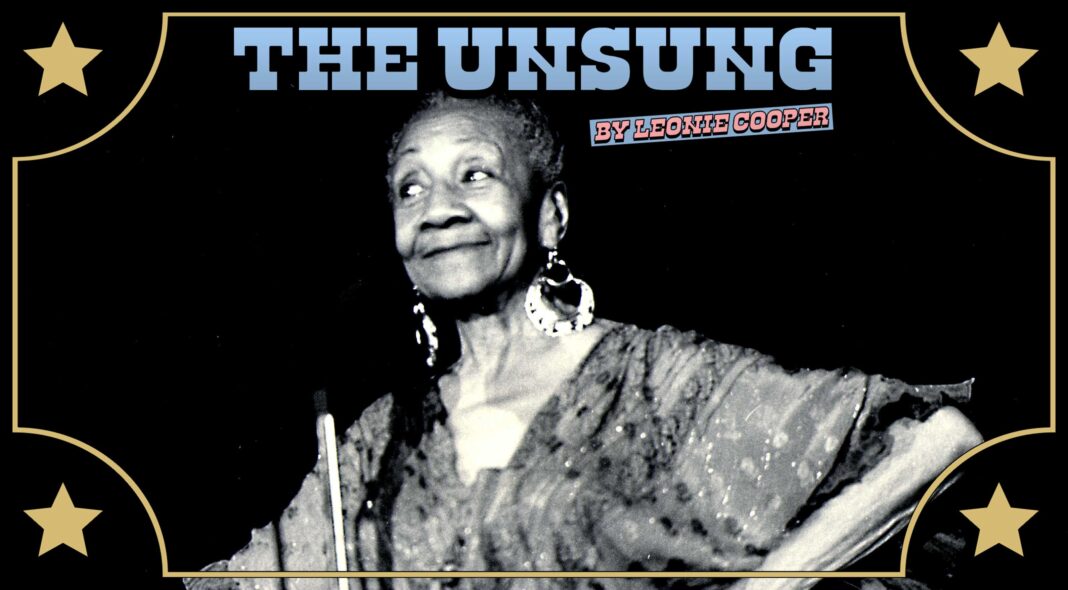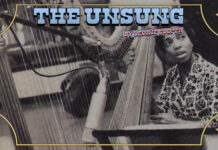I first came across Alberta Hunter while flicking through the $1 racks in the vast Hollywood branch of Amoeba Records on Sunset Boulevard. When I was living in Los Angeles it became a weekly ritual and, amongst the endless Loggins and Messina LPs, there were always gems; a Linda Ronstadt EP here, a Louvin Brothers album there. One day I pulled out a soundtrack for Remember My Name, a film I’d never heard of but that featured in huge lettering the name Alberta Hunter and a photo of an elderly woman half in shadow, leaning against a wall. Without too much thought I added it to the pile of vinyl, paid my 10 bucks and carted it back home on the 302 bus to Silver Lake.
It was the best of the bunch. Alberta was already 83 when Remember My Name – a long forgotten thriller starring Charlie Chaplin’s daughter Geraldine (and which I still haven’t seen, sorry, and probably never will) – was released in 1978. Featuring her own piano-led compositions, the album marked an impressive comeback for the veteran jazz singer, who’d spent the past 20 years working as a nurse.
Born in 1895 to a brothel maid and train porter in Memphis, Alberta Hunter’s life was worthy of a blues ballad while she was still in utero. After her father deserted the family, Alberta would move to Chicago and score a job singing in a bordello when she was still a teenager. Unsurprisingly, it wasn’t the safest of engagements – it’s said that her piano player was shot and killed during a performance. It didn’t put her off. Alberta’s talent for improvisation and winning over a crowd – armed or otherwise – was such that she soon upgraded to performing at the city’s blossoming jazz clubs and in 1917 she toured Europe, falling in love with Paris, which treated African-American artists with a kind of respect that was rarely matched back home. She felt comfortable enough to also be accompanied by her lover, Lottie Tyler, the niece of famed Black vaudeville entertainer Bert Williams, and with whom Alberta was romantically involved until Tyler’s death in 1960.
By the 1920s, Alberta was a cabaret queen of repute, singing on the London and New York stage, her playful vocals casting her as the ultimate jazz baby, rolling through material about no-good sweethearts and sharing cigarettes with lovers, as well as Cole Porter standards like the classic murder ballad ‘Miss Otis Regrets’, which would later be made famous by Ella Fitzgerald.
She’d write her own songs too, most notably the Fredian swinger ‘Downhearted Blues’ (“I ain’t never loved but three men in my life/My Father, my brother and the man that wrecked my life”). It’d end up shifting almost two million copies when covered by blues icon Bessie Smith in 1923, but Alberta would get screwed on the royalties, receiving just a couple of hundred dollars for the worldwide hit.
There was still no stopping Alberta. She’d appear alongside Paul Robeson in the London production of Show Boat, record with Louis Armstrong and Sidney Bechet and entertain the troops in Casablanca during WWII.
But when her beloved mother died in the mid-1950s, Alberta retired from the stage. Using a fake diploma, she enlisted in nursing school and spent the next two decades working in a hospital on New York’s Roosevelt Island, only forced to retire when staff found out she was 70. Alberta was actually in her early 80s and ever the grafter, simply picked up her musical career where she left off, releasing the gorgeous ‘Amtrak Blues’, scoring a regular spot at a Greenwich Village jazz club and regularly appearing at the White House for her most famous fan, President Jimmy Carter.
“I’m having a fiesta while I’m living/Because tomorrow I may die,” belted out the perpetually perky Alberta on Amtrak Blues’ swinging standout ‘I’m Having A Good Time’. She passed away in 1984 at the age of 89, after a fiesta that lasted a lifetime.
Hear Alberta Hunter’s influence in the music of:
Celeste
Lianne La Havas
Joy Crookes
READ MORE: The Unsung is a weekly series. Get to know the stories of more musical heroes.







